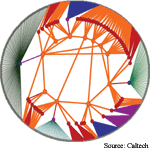|
NEWS
|

|
 |
The
Net: not so vulnerable
A key finding from researchers who have teased out the
structure of the Internet during the past half-dozen years
has been that that, though the Internet is resistant to
random failures, attacks targeting the largest hubs could
fragment the network...
|
Cheap
solar cells get efficient
Plastic solar cells promise to dramatically lower
the cost of generating electricity from sunlight -- once
researchers figure out how to make them more efficient...
|
Swimming
blood cells
Scientists have turned red blood cells into microbial
cyborgs by equipping them with artificial filaments and
using magnetic fields to cause the filaments to propel
the cells...
|
Microbes
drive sensor
Scientists are looking for ways to use simple
chemistry techniques to make electronics that are smaller,
faster and cheaper than today's chip-based devices. Researchers
have recently begun using microbes in this effort, both
as templates for wires and electrodes, and also as living
components whose biological responses can play a role
in the devices' operation...
|
Bits
and pieces
Shape-shifting
surgical tool, molecular rotary motor and biochip heaters
in coolers. |
FEATURES
|
View
from the High Ground: USC's Michael Arbib
Computing matter, the action-perception
cycle, imagining tea with grandmother, passionate robots,
transferring brain settings, the Mirror System Hypothesis,
Hurricane Katrina, universal health care, and Goethe.
|
How
It Works: Two schools of cryptography
There are two approaches to securing information:
extremely difficult mathematical problems and the randomness
of nature. Both count on the limits of technology. |
|
 |
News RSS feed 
Blog RSS feed 
Bookshelf RSS feed

New: TRN's
Internet Services
TRN's Jobs Center
|
| |
SMALLEY'S
RESEARCH WATCH |
| October
11, 2005 |
Grammar
as time machine
Researchers have been able to show how early
humans spread throughout Europe and Asia over
the past several thousand years or so by studying
changes in language vocabulary. The method
has proved reliable going back only about
8,000 years, however, because it becomes impossible
to differentiate between real relationships
and chance resemblances that far back in time...
October 5, 2005
Uphill
water walkers
September 30, 2005
Seashells
and CO2
September 27, 2005
A-salting
freshwater |
|
|
| |
"If
we consider the fate of New Orleans with Hurricane
Katrina, we can certainly see challenges for technology
in terms of better design and maintenance of levees,
or in communication systems, but we also see the
fruits of pork-barrel politics, lack of planning
and coordination (technology can help, but one needs
bright dedicated people to make use of it), and
acceptance of a status quo in which too many people
live in poverty."
- Michael Arbib, University of Southern California |
|
| |
|
| |
Thanks
to Kevin from
GoldBamboo.com
for technical support |
|

